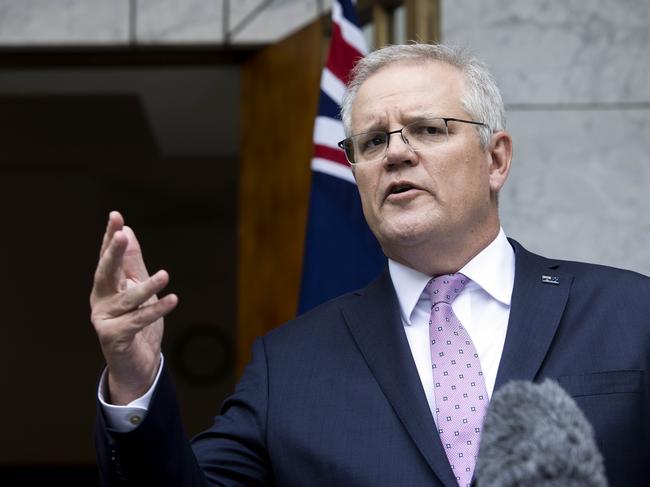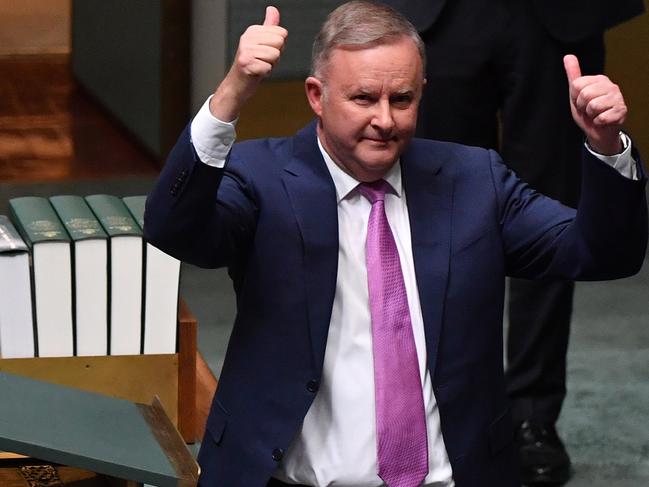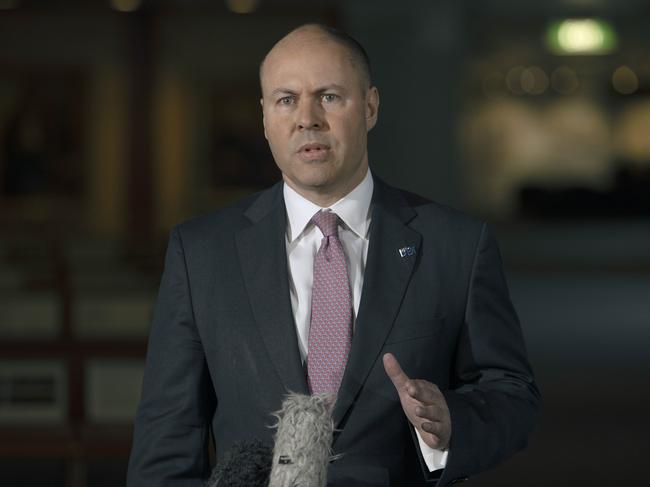Australians back Scott Morrison’s COVID budget
Scott Morrison’s post-COVID budget has received an overwhelming stamp of approval from voters as the government hopes bringing forward tax cuts will encourage Australians to splash their cash and fire-up the economy.

National
Don't miss out on the headlines from National. Followed categories will be added to My News.
Four in five voters have endorsed the Morrison government’s income tax cuts, believing they will be better off, with a majority of Australians convinced the budget stimulus will propel the economy out of COVID-19 recession.
According to the latest Newspoll conducted exclusively for The Australian, the government received a bump despite a $1 trillion debt, with popular support for the Coalition elevating to its equal highest level since last year’s election.

The jump for Scott Morrison, whose personal approval ratings remain at record highs, came as the Prime Minister campaigned in Queensland ahead of this month’s state election.
Mr Mrrison’s budget was one of the best-received in more than a decade as 42 per cent of voters believed it was good for the economy compared to 20 per cent who believed it was negative.
Labor leader Anthony Albanese, however, saw his disapproval ratings rise three points in the wake of a budget reply speech that accused the government of leaving people behind.
The Newspoll showed 90 per cent of Coalition voters supported the bringing forward of personal income tax cuts for low- and middle-income earners with 79 per cent of Labor voters also supporting the package, which delivered more than $2000 into the pockets of workers.
Also, 26 per cent of voters compared to 23 per cent believed that they would be personally better off following the budget.
While 49 per cent of voters said that it would provide the stimulus needed to boost the economy out of the COVID-19 recession, compared to 20 per cent who claimed it would be bad for the economy.
The second budget delivered under Mr Morrison gave the Coalition a one-point rise in its primary vote to 44 per cent. After a similar result three weeks ago, the government is back to its equal highest level of popular support since the last election and a one-point rise in the two-party-preferred lead for the Coalition to 52-48 per cent.
Mr Morrison’s high approval ratings remained unchanged at 65 per cent, which marks the longest period of consistent popularity for a prime minister since the first year of Kevin Rudd’s term in 2008.

The budget made no impact on Mr Morrison’s approval ratings, with 65 per cent claiming to be satisfied with his performance compared to 31 per cent claiming otherwise.
Mr Albanese, however, suffered a fall in his net approval ratings. While those satisfied remained steady at 39 per cent, his disapproval ratings rose from 40 per cent to 43 per cent.
Despite this, Mr Morrison fell two points to 57 per cent as the preferred prime minister, with Mr Albanese rising a point to 28 per cent on the previous poll.
Popular support for the Greens fell a point to 11 per cent, with One Nation remaining on three per cent and support for other minor parties the same at eight per cent.
HOW AUSTRALIANS WILL SPEND THEIR TAX CUTS
Meanwhile, Australians have revealed how they will use their extra money as ten million low and middle-income workers prepare to receive a one-off tax break worth around $1000.
As widely anticipated, 11.6 million workers will pay lower tax rates, with the 19 per cent tax rate top threshold rising from $37,000 to $45,000.
The 32.5 per cent top threshold will jump from $90,000 to $120,000, as the Government gives back some of the revenue it could have expected from bracket creep, where workers who earn more are hit with higher rates of tax.
The cuts will be fast-tracked to this year, two years earlier than planned, and backdated to July 1.
The Federal Government hopes personal income tax cuts will get the nation spending, but a News Corp reader poll of 10,200 people found that more that one in three planned to save the extra money.
A quarter of respondents said they would use the money to pay down their mortgage, while 15 per cent said they would splurge on an item.
Ten per cent of those polled said they would put the money towards a holiday, while another one in ten said they would invest it in superannuation or shares.
Just 2 per cent indicated it would help with school costs, and 1 per cent said they would use the cash for further study.
In a separate poll taken by News Corp readers, more than half of respondents said the Budget would leave them better off.
More than one in three said it would make no difference to their financial situation, and 9 per cent said they would be worse off.

The more controversial phase three tax cuts, which would see 95 per cent of taxpayers paying a 30 per cent rate, and which provide substantial relief to higher-income workers, have been left in the 2024-2025 financial year, meaning they would likely become part of an election Budget next year.
Keen to keep money moving through the COVID-ravaged economy, the Government has abandoned plans to get rid of its low and middle income tax offset during its phase two tax plan, instead deciding to keep it in place as a one-off.
The majority of the 10.1 million taxpayers who will benefit are those earning under $90,000.
Middle-income workers earning between $50,000 and $90,000 will be the biggest beneficiaries, and will pocket an extra $1080 from the offset. A dual-income couple in this bracket will receive $2160 back into their pockets as a one-off.
The retention of the rebate avoided the perception that middle-income workers would miss out on further cuts, given they enjoyed a $1080 benefit last year
The rebate will be applied when people lodge their tax return after June 30 next year. The reduction in pay-as-you-go tax will likely kick in within weeks, with Labor indicating it would wave the phase two cuts through.
A low income tax offset will also remain, and will rise from $455 to $700. While it tapers off as incomes rise, it will be available for those earning under $66,667.
Treasurer Josh Frydenberg said more than seven million Australians would receive tax relief of more than $2000 this year.
According to the Budget figures, a worker on an average income of $85,000 a year will pay $2160 less tax this year than they did in 2017-2018.
This includes the $1080 offset one-off rebate.
The lowest-paid Australians earning around $30,000 a year will pay $510 less in tax, while a high-income worker earning more $200,000 will pay $2565 less in tax than they did four years ago.
The nation’s 4.6 million middle-income workers, who are paid between $48,000 and $90,000, will get tax relief of between $2160 and $2295, compared to four years ago. Again, this figure includes the one-off rebate of $1080.
The tax cuts and one-off rebates combined would see a dual-income family keep an additional $5490 this year than they would have four years ago, while the maximum benefit a single will pocket will be $2745.
MORE FEDERAL BUDGET NEWS
How Australia will climb out of record $1 trillion debt pile
How first home buyers can snap up their dream property faster
Big change to paid parental leave as childcare centres raise fees
Super changes to stop Aussies being gouged by fees
Winners and losers: Did you come out in front?
Pensioners to pocket extra $500 tax-free payments

The Government has also lifted the amount singles, families, pensioners and seniors can earn by around $500 before the Medicare levy kicks in.
The fast-tracked tax cuts and retention of the low and middle income tax offset will cost the Government $17.8 billion in foregone revenue across the forward estimates.
But Treasury estimated the tax cuts would boost GDP by $3.5 billion this year alone and create an additional 50,000 jobs by 2021-2022.
Fast-tracked income tax cuts included in the Federal Budget will alleviate pressures upon households and businesses, the Commonwealth Bank says.
The major bank has been advocating for the cuts to be fast-forwarded for the past 18 months.
Commonwealth Bank chief economist Stephen Halmarick said the permanent changes in tax brackets would boost take-home pay and consumer spending.
“If you permanently decrease someone’s tax liability, they can adjust their behaviour on a permanent basis,” he said.
He said the changes to instant asset write-offs and loss carry-back refunds for businesses making a loss due to COVID-19 would be significant in generating economic activity during the recovery.
“All those policies … will really be important in maintaining cash flow while we are in this recession,” he said.
Deloitte Access Economics partner Christ Richardson praised the government for fast-tracking income tax cuts to Australians.
“The dominant thing is the tax cuts … but there are other things too,” Mr Richardson said.
“The wage subsidies are a good idea for the young unemployed. The government will subsidise them for a year, if we employ them back. Same story around the similar policies for apprentices.”
Mr Richardson said the low cost of debt was also good news.
“The interest payments that we are making are no higher across the entire four years the government’s forecast; in fact they’re lower than they were in 2018.”
MORE FEDERAL BUDGET NEWS
Barefoot Investor: Why Treasurer’s advice will leave you broke
$103m boost to build radioactive waste dumping ground
New plan to help Aussie Diggers
New top cop squad and plan to catch spies, white collar crims
Stay at home Aussies can stay on parent’s health plan for longer
Virus-hit aged care sector gets $2bn boost
Private schools’ huge funding boost over public
Domestic violence victims left behind in 2020 budget
Hildebrand: What the Treasurer said, and what he really means
Tech giants in tax firing line
Originally published as Australians back Scott Morrison’s COVID budget

